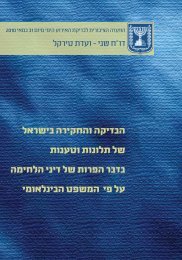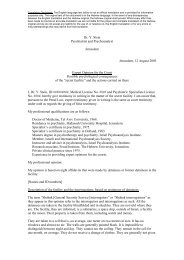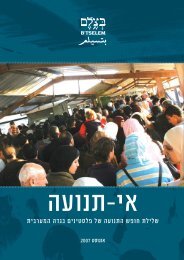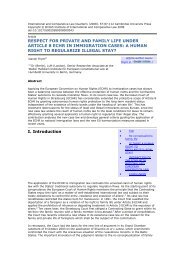HCJ 10650/03 Abu Gwella et. al v
HCJ 10650/03 Abu Gwella et. al v
HCJ 10650/03 Abu Gwella et. al v
You also want an ePaper? Increase the reach of your titles
YUMPU automatically turns print PDFs into web optimized ePapers that Google loves.
a resident will be granted residency status pursuant to the Regulations if the Minister<br />
of the Interior exercises his discr<strong>et</strong>ion and so decides. Over the years, center of life has<br />
been the only criterion that was taken into account in deciding wh<strong>et</strong>her to exercise that<br />
discr<strong>et</strong>ion.<br />
The same criteria were <strong>al</strong>so tradition<strong>al</strong>ly used regarding children born outside of<br />
Israel, <strong>al</strong>most without differentiation.<br />
99. As we have seen, the Law restricts the discr<strong>et</strong>ion of the Respondent regarding the<br />
granting of permits to reside in Israel. The Law does not apply, therefore, to a status<br />
granted pursuant to Section 12 of the Regulations (even if d<strong>et</strong>ermining the status<br />
entails exercise of discr<strong>et</strong>ion). However, Section 12, whose principles apply to every<br />
child, expressly mentions only “a child born in Israel.”<br />
100. Based on a liter<strong>al</strong> understanding, the granting of a status to children born outside of<br />
Israel f<strong>al</strong>ls, for this reason, within the gener<strong>al</strong> authority that the Entry into Israel Law<br />
gives to the Minister of the Interior to grant permits to reside in Israel. This authority –<br />
the exercise of discr<strong>et</strong>ion – is revoked by the Law.<br />
101. The P<strong>et</strong>itioners will argue below that the Law grossly infringes their fundament<strong>al</strong><br />
rights, which are protected constitution<strong>al</strong> rights, and does not comply with the<br />
limitations clause of the Basic Law: Human Dignity and Liberty.<br />
The P<strong>et</strong>itioners will argue, in this context, that the Law is intended to advance<br />
forbidden objectives and is racist.<br />
In addition, the P<strong>et</strong>itioners will argue that tying the hands of the Respondent by not<br />
l<strong>et</strong>ting him exercise discr<strong>et</strong>ion in particular cases is prohibited and excessive,<br />
regardless of any proper purpose that it seeks to achieve. This revocation of discr<strong>et</strong>ion<br />
contravenes fundament<strong>al</strong> concepts of law, which require that persons be treated on an<br />
individu<strong>al</strong> basis and reject arbitrary acts and collective harm.<br />
Restricting discr<strong>et</strong>ion <strong>al</strong>so reflects a decision to employ a more harmful means, for<br />
every proper purpose can <strong>al</strong>so be achieved by employing a less drastic means – the<br />
exercise of discr<strong>et</strong>ion.<br />
The harm that the Law causes children and families, and the violation of the principle<br />
of equ<strong>al</strong>ity and of human dignity are extremely grave, while the purpose is, at best,<br />
vague and hypoth<strong>et</strong>ic<strong>al</strong>. Thus, the Law <strong>al</strong>so fails to me<strong>et</strong> the test of proportion<strong>al</strong>ity in<br />
the narrow meaning of the term.<br />
102. In addition, the Law is improper to the degree that it relates to children, because the<br />
legislative process deviated greatly from the rules s<strong>et</strong> forth in the Notation of<br />
37









